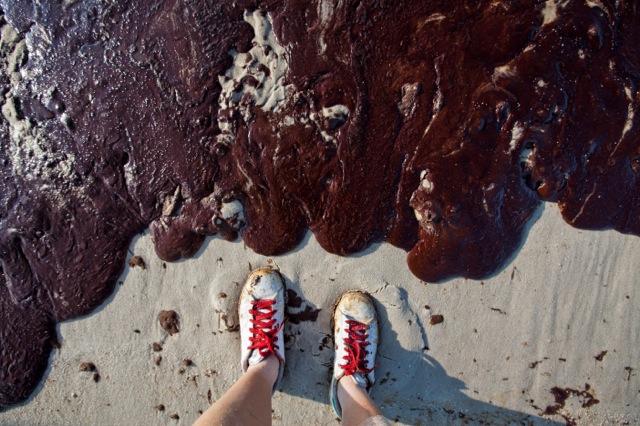Just prior to the four-year anniversary of the BP oil spill, BP and the Coast Guard issued press releases. BP announced the “active cleanup” in Louisiana is over, while the Coast Guard stated the clean up response is far from over. “We are absolutely committed to continuing the clean-up of Deepwater Horizon oil along the Gulf – for as long as it takes,” Coast Guard Capt. Thomas Sparks wrote.
The Washington Post reported on the “dueling press releases.” But Geoff Morrell, BP Senior Vice President for US Communications & External Affairs, told DeSmogBlog,
“We have never suggested the work of the U.S. Coast Guard or BP is over. Our announcement Tuesday merely highlighted the end of active clean up of the Gulf shoreline. We believe that is a very significant achievement that resulted from four years of sustained work with the USCG. However, that accomplishment has not in any way diminished our commitment to the Gulf. To the contrary, we will continue to work with the USCG, primarily in responding to reports of any residual Macondo oil and taking action where removal is required.”
BP‘s claim that it would “make things right” still echoes from its advertising campaign. But scaling back clean-up operations means the burden of oil sighting reports will fall more on the public. The Gulf Restoration Network, a nonprofit environmental group, is dismayed. GRN spokesman Raleigh Hoke told the Washington Post, “It’s clearly premature to end the active cleanup.”
Plaquemines Parish Coastal Zone Director P. J. Hahn, who continues to monitor the effects of the BP spill, pointed out last year that oil sightings come from fishermen and environmental groups more often than from the Coast Guard or BP.
Hahn has led a crusade to save two barrier islands that were bird rookeries before the spill. For the first two years after the spill, the birds returned, but by 2013 the birds had almost nowhere left to nest and abandoned the islands.
The oil that hit the island killed the roots of marsh grass and mangrove trees that held the islands together, speeding up coastal erosion that was already eating away at the islands.
By now, the islands have all but disappeared. No birds were found on the two islands this year that have all but disappeared. Instead Hahn and reporter Bob Marshall found some birds nesting on another barrier island nearby in a rookery that is not nearly as large as the ones that Hahn still hopes to restore.
How prepared are oil companies and the Coast Guard for spills?
DeSmogBlog put that question to Dr. Riki Ott, a marine toxicologist and Exxon Valdez survivor who has been monitoring the Valdez oil spill. Ott says, “We are less prepared now to respond to an oil spill than we were 25 years ago.”
During the recent comparatively small spill near Galveston, Texas, the oil was not contained before hitting the shore, and miles of coastline were contaminated. Ott believes putting out boom is an inadequate response.
“Tar oil sinks and goes under the boom. Conventional oil goes over and under the boom in any kind of wave action much over a foot. Boom must be constantly tended as it is made more to deflect oil from sensitive areas or corral it. It doesn’t work if it’s just deployed and left as what happened in the Gulf during the BP [Deepwater Horizon] disaster,” says Ott.
The impact of the BP disaster on the environment is ongoing. Though BP refutes independent scientific studies as well as the government’s assessment of how much oil was spilled, the photographic evidence of what happened is hard to ignore.
Here is a look back at photographs from 2010.
Subscribe to our newsletter
Stay up to date with DeSmog news and alerts







